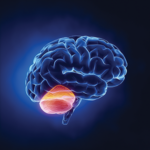 The results of an early-stage clinical trial indicate that deep brain stimulation (DBS) applied to the cerebellum may help recovery of upper limb function following stroke. The findings, published in Nature Medicine, support the design of larger, blinded clinical trials to fully assess the benefit of such a treatment. This trial, which was conducted at the Cleveland Clinic, Cleveland, is the first-in-human test of post-stroke cerebellar DBS, supported by the National Institutes of Health’s Brain Research through Advancing Innovative Neurotechnologies Initiative, or The BRAIN Initiative.
The results of an early-stage clinical trial indicate that deep brain stimulation (DBS) applied to the cerebellum may help recovery of upper limb function following stroke. The findings, published in Nature Medicine, support the design of larger, blinded clinical trials to fully assess the benefit of such a treatment. This trial, which was conducted at the Cleveland Clinic, Cleveland, is the first-in-human test of post-stroke cerebellar DBS, supported by the National Institutes of Health’s Brain Research through Advancing Innovative Neurotechnologies Initiative, or The BRAIN Initiative.
Twelve individuals with moderate-to-severe upper extremity impairment following stroke were enrolled to receive DBS to an area within the cerebellum—the dentate nucleus (DN). This region was chosen because of the well-established role the cerebellum plays in motor function, as well as decades of animal studies showing the importance of the circuit connecting the DN to the motor cortex. Each participant received physical therapy before, during, and after DBS, which was delivered continuously for 4 to 8 months.
The primary goal of this study was to determine whether cerebellar DBS in combination with physical therapy is a safe and potentially effective treatment for post-stroke motor deficits. No serious adverse events or device failures were reported during the trial. These encouraging results support the design of larger, more rigorous clinical trials aimed at determining how effective DBS plus physical therapy is compared to just physical therapy alone.
The study’s secondary findings were also promising, with nine out of 12 participants showing improvements in motor function. These improvements persisted even after DBS was turned off. Importantly, the time that had passed since the stroke occurred did not seem to affect the potential for improvement. Not all improved to the same degree. Participants who retained some level of motor function in the hand experienced clinically significant recovery. However, participants with a low level of motor function in hand showed only minimal benefit. All who had some measure of control showed improvement over the course of the treatment.
The findings of this trial, while preliminary, suggest that DBS when added to physical therapy can provide benefit to someone who has had a stroke up to three years prior.




